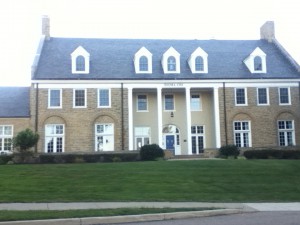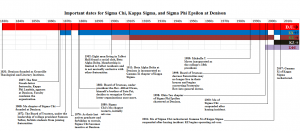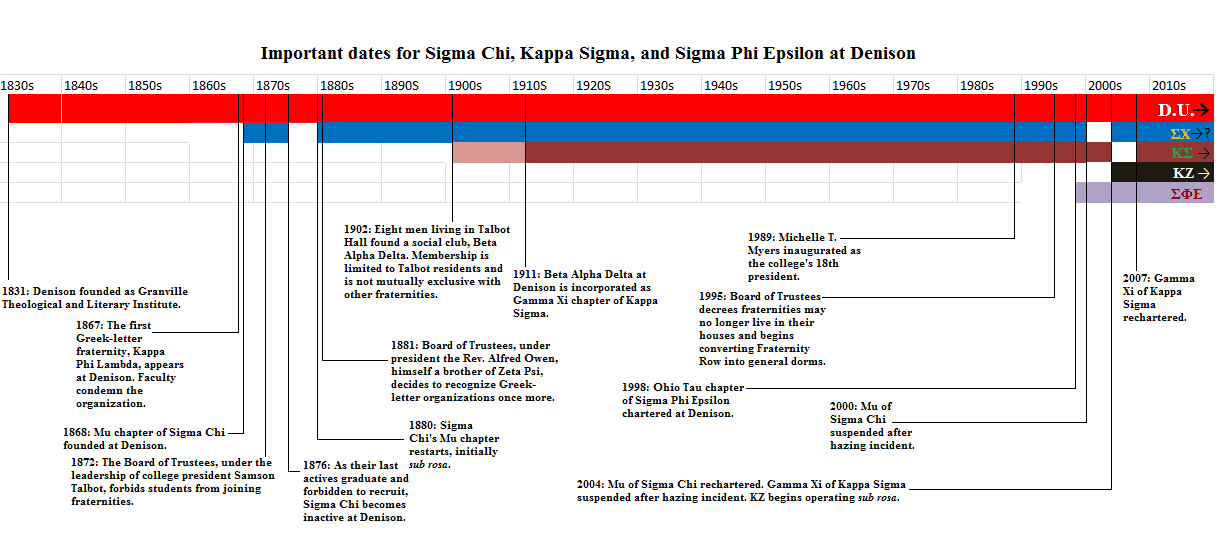Denison’s administration has reached its decision on three fraternities suspended this spring for allegedly violating the Student Code of Conduct. After pursuing investigations into Denison’s chapters of Sigma Chi, Kappa Sigma, and Sigma Phi Epsilon, the administration reached three separate decisions. Only Kappa Sigma may resume normal activities in the fall semester. Sigma Chi has been placed on disciplinary probation until spring of 2014, and Sigma Phi Epsilon has been placed on disciplinary suspension; it may begin recolonizing in 2018.
All three fraternities are members of the Interfraternity Council (IFC), Denison’s largest male Greek council, and were suspended for the same reason: “pending investigation for violations regarding the Student Code of Conduct,” or SCC. According to Aimee Maczko, who was Associate Director of Campus Leadership and Involvement serves as the advisor to all four Greek councils, in the case of each interim suspension Denison worked hand-in-hand with the respective fraternities’ national headquarters to evaluate the situation. While the school website explicitly uses the term “investigations,” Maczko preferred “explorations of allegations.” These explorations involved the review of anonymous tips, “following up with particular individuals,” interviews, and connecting with that chapter’s national headquarters. While Denison’s administration and the national headquarters of a given chapter may reach separate conclusions about a given allegation, Maczko says all three nationals in question treated this spring’s events as “serious matters in their eyes.”

Sunset House, the longtime home of Sigma Phi Epsilon’s lodge space. SigEp is inactive at Denison until 2018 at the earliest, Maczko says.
“We don’t have any brothers of Sigma Phi Epsilon”
Denison’s chapter of Sigma Phi Epsilon, Ohio Tau has been placed on disciplinary suspension through 2018. The chapter was founded in 1998 and had 45 undergraduate actives and pledges as of Bid Day this past spring semester. According to Associate Director of Campus Leadership and Involvement Aimee Maczko, who serves as the faculty advisor for all four Greek councils at Denison, this effectively means that “officially, on Denison’s campus, we don’t have any brothers of Sigma Phi Epsilon.”
Although Maczko says that “Sigma Phi Epsilon was found responsible…for the violations of the Code of Conduct,” she declined to comment on exactly what actions the administration discovered. The school website adds that the chapter’s “growing risk management concerns” and “an inability to more significantly improve its behavior” contributed to its suspension.
Sigma Phi Epsilon may return to campus no earlier than 2018. “At the end of the academic year in 2018,” Maczko says, “Denison University will be prepared to discuss with Sigma Phi Epsilon possible recolonization at Denison, should student interest in the fraternity prompt such conversation.”
Maczko explains that “as a suspended chapter, the former members of the Ohio Tau chapter are not allowed to wear the Sigma Phi Epsilon letters on campus or at any university-sponsored events, and may not represent themselves as a group in any way under the Sigma Phi Epsilon moniker, or any other moniker.” She adds that “evidence” of any such representation may “impact the university’s decision to consider recolonization of the Ohio Tau chapter.”
Unofficial representation of this kind would not be new at Denison. Two other unrecognized, self-selecting, all-male social clubs (sometimes referred to as “underground fraternities” by the student body), using the names KZ and FIJI, operate presently on campus. The school website states that “these students are improperly representing themselves under the guise of an organization and are not legitimate.” Nevertheless, the same web-page indicates that the school is aware that these groups grew out of formerly recognized fraternities, namely, Kappa Sigma and Phi Gamma Delta.
“Underground groupings of individuals,” says Maczko, “are a continued concern on this campus. We have some groupings of students that collect themselves under certain names…and without the oversight of the Campus Leadership and Involvement Center, without them having a constitution or bylaws, without them having to follow basic rules, it’s extremely difficult. So we continue to have issue,” she continues, “with groups of individual students that assemble outside the context of an organization and do things that are not appropriate.”
Maczko is unsure whether SigEp will go down the road of KZ and FIJI, but “personally” thinks it is unlikely. “I don’t know what students will do,” she says. “It’s my hope [that Sigma Phi Epsilon will not go underground] because when you’re suspended you can’t use the name and the moniker, which would mean you can’t do the ritual and all those things…It is my hope because of my respect for fraternity.” However, “you never know,” she says.
Others see the possibility as more likely. Adam Rice ‘15, a studio art major from Kalamazoo, Mich., says that SigEp is “too big of a group” to not go underground. “What’s going to end up happening,” he predicts, “is they’re all still going to hang out anyway…and they will probably have some kind of organization…To an extent, they will be underground.” Rice is a member of Beta Theta Pi.
Maczko adds that there’s little the school can do regarding underground organizations. “There’s a spectrum of activities that can and cannot be construed as group activities,” she says, “and there’s no quick fix.” She says she is unaware of the membership of these organizations, and that the only way the administration can pursue disciplinary measures against individuals is if they have knowledge of specific “individuals and the specific wrongdoing.”
The Denisonian contacted former chapter president Cameron Crowe ‘15 regarding the SigEp decision. Crowe said he was in process of “speaking with other members of the fraternity to evaluate the situation we are [f]acing and the next steps to take,” and did not provide further commentary as of the publication of this article.

Built in 1930, the Sigma Chi house occupies 1 Fraternity Row at Denison. Sig Chi’s status with the university is pending, to be reviewed spring 2014.
Sigma Chi is “not in…good standing with Denison”
Sigma Chi’s Mu chapter, which was first chartered at Denison in 1868 (making it the oldest Greek-letter organization on campus) and had 49 actives and pledges as of spring Bid Day, has been placed on what is called “disciplinary probation.” They will retain this status until 30 Apr. 2014, near the end of the 2013-2014 academic year. Maczko calls Sigma Chi’s status “the most important” out of the three cases.
“As a chapter on probation,” says Maczko, “the organization is not considered to be in good standing with Denison. During the period of disciplinary probation, the Mu chapter of Sigma Chi is tasked with building stronger internal operations and officers through participation in international Sigma Chi trainings and working closely with designated alumni officers and international staff for officer training and transition, focusing on ritual and brotherhood and the absence of alcohol.” Sigma Chi has also been tasked with hosting a workshop on hazing prevention during the upcoming academic year. The administration’s goal is to see Mu chapter become “a leading example of a values-based organization at Denison and a positive contributor to the community.”
The determination of whether Mu chapter will remain active at Denison or become suspended like SigEp will be made in April 2014, Maczko says. During the period of disciplinary probation, brothers will be able to wear their letters and engage in “service, philanthropic, and ritual activity, but in a manner consistent with Sigma Chi expectations.” Brothers of Sigma Chi will be ineligible for executive positions within IFC, and will be unable to participate in events involving other fraternities and sororities, including “serenades, Greek week, Anchor Splash, etc.”, with the exception, Maczko says, “of events that are connected to Sigma Chi service, philanthropy, or ritual expectations.” Sigma Chi may also continue to field intramural sports teams.
“All participation or representation desired by the chapter,” says Maczko, “must be discussed with CLIC,” which will then have the authority to either approve or deny the request “at [its] discretion.”
While Maczko agrees that the decision about Sigma Chi occupies a kind of middle ground between SigEp and Kappa Sigma, she says that she “could not put them on a spectrum. We’re looking at these chapters overall, and the incidents that were alleged in the spring…This is not just recent findings regarding hazing and risk management concerns, but it’s their conduct history” as well.
The Denisonian contacted Sigma Chi’s chapter representative, Caleb Randall-Bodman ‘14, with questions regarding the decision on Mu chapter. As of the publication of this article, Randall-Bodman has not responded to these enquiries.

Kappa Sigma house, at the very end of fraternity row, will continue to lodge brothers of Gamma Xi chapter this year. The chapter was found not responsible for allegations by the administration, says Maczko.
Kappa Sigma restored
Kappa Sigma’s Denison chapter, Gamma Xi, says Maczko, was found “not responsible and has been reinstated to its standing.” Kappa Sigma was first chartered at Denison in 1911, and had 51 pledges and active brothers on campus as of Bid Day 2013.
“They will continue to move forward as a positive contributing organization to the campus,” adds Maczko, and will enjoy full rights and privileges as an officially recognized IFC fraternity at Denison. Since they are no longer on interim suspension, Kappa Sigma will be able to initiate its newest pledge class, recruited this past spring, in the fall semester.
Members of Kappa Sigma seem pleased with the result, but not the process. Vince Cullen ‘14, a music major from Medina, Ohio, and a brother of Gamma Xi chapter, spoke of his notification of the chapter’s reinstatement as “such great news…I’m really excited.” Nonetheless, he criticizes the investigation as “invasive…We were not given an opportunity to defend ourselves,” he says. “There wasn’t really anything we could do. We felt pretty helpless,” he adds.
Cullen says that brothers were not allowed access to their lodge space during the interim suspension, posing a problem for members who used the space for various utilities such as laundry. “We were being strung along by the administration a little bit,” he says. “I can’t say any of us were too happy with the way it happened, and we cooperated as best we could, because that was all we really could do.” Cullen says that the administration searched through Kappa Sigma’s lodge space during the investigation in addition to conducting interviews. This is complicated by the fact that Kappa Sigma does own its house, and rents it out to the university as student housing.
On the other hand, Cullen doubts that Kappa Sigma’s suspension was a result of any campaign by the administration. “Whether or not it was part of some master plan to eliminate Greek life…is really beyond me,” he says. “I don’t think that they’d be that against it, considering especially because there are organizations on campus that are doing a really up-standing job and setting a good example…I don’t think they’re plotting against us.”
However, Cullen calls the focus of the administration on hazing only within fraternities as “misrepresentative. Let’s say…the football team was hazing a new member,” he continues, “would you kick the football team off? It raises questions like that.”

Some important dates and history for Kappa Sigma, Sigma Chi, and Sigma Phi Epsilon at Denison, with dates according to the Denison University website and Gamma Xi’s alumni website. Click for zoom.
“Adding value”
In the spring, the suspension of three of seven IFC fraternities prompted widespread discussion of the role of Greek life on Denison’s campus, as showcased in the Bullsheet and in this newspaper. Some students believed that the three suspensions constituted a “crackdown” on Greek life at on the Hill. Comparisons were drawn to programs like those carried out under the presidency of Michelle Myers in the 1980s and 90s. Some students, such as Brennan Duckett ‘13 in the Bullsheet, suggested that incoming president Adam Weinberg has an anti-Greek agenda. Opinion of the Greek scene at Denison remains mixed, and debate is likely to continue into the fall.
Maczko agrees that “within the past year, a lot of things have come to the forefront.” She continues, “We want our fraternities and sororities to add value. At the point they’re not adding value, they should not be here at Denison.” She and the entire administration are working to create healthier student culture. June 5 – 8, Maczko, alongside Dr. Kennedy, Director of Campus Leadership and Involvement Natalie Pariano, Head Football Coach Jack Hatem, Assistant Dean of Students Greg Phlegar, and Director of Campus Security Garrett Moore, attended the Novak Institute for Hazing Prevention. Maczko says she wants students to have “a fun and safe time at Denison, and that is without hazing. It can be done without hazing.”
Regarding additional or increased oversight of fraternities, Maczko notes that there is “some hesitancy to move forward… because they don’t want everything construed as hazing. We do take allegations seriously, we do take the anonymous tip line seriously, but we’re always in the business of trying to improve the fraternity and sorority community.” Maczko stresses that Security’s anonymous tip line is indeed secure, and that members of Greek organizations can report violations of the SCC without exposing their identity – which, in the case of a pledge, may endanger their initiation.
Nonetheless, Maczko affirms that she hoped the investigations would have ended more positively. “I don’t ever want to say in my life that losing a chapter on campus is a positive thing,” she says.
However, even some members of fraternities that were not being “explored” criticize the administration’s actions. Rice says that “as far as openness to the student body and the conclusions they came to, I don’t know if [it] was, all precisely, fair.” He highlights the problem aroused by the Kappa Sigma case in particular, since brothers were denied privileges even as, in the end, the administration found the allegations false. “They were suspended for a whole semester under an allegation that turned out be false,” he explains, adding, “I feel that the school should have had more conclusive evidence before they basically suspended [Kappa Sigma’s] right to meet, which is a really big deal for any organization.”
“I don’t condone any hazing of any kind,” adds Rice, regarding Sig Chi and SigEp in particular, “but no one really knows exactly what those specific events were…so as far as transparency [is concerned]…I’ve had to find out through gossip.”
Some independent students agree with these sentiments. “Some people see Greek life as nothing more than organized hazing and drinking, but I would say that there are legitimate things that fraternities and sororities do such as philanthropy,” says Ben Flox ‘14, a theatre major from the Cleveland, Ohio area. “I think that just because certain fraternities and sororities have engaged in hazing does not devalue what other fraternities and sororities have done.”
Others disagree. One criticism is that the administration has not enough to prevent hazing in the past. “I think there are more serious measures and actions that the administration could take if they truly wanted to crack down or eliminate [hazing] violations,” says Conner Toth ‘15, a geoscience major from Charlotte, N.C. “If the university’s top priority was indeed creating autonomous thinkers and discerning moral citizens then I think the administration’s handling of the suspected hazing would be different, and thus their views on the benefits of Greek life.”
Toth also critiques the availability of information on these suspensions. “The student body – including myself – may be more open to the discussion if the administration would provide more details and transparency in their process and reasoning behind the suspensions and suspected hazing,” he says.

